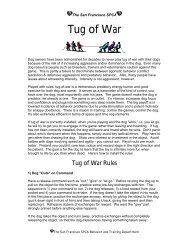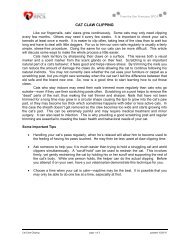Kitten Kindergarten - San Francisco SPCA
Kitten Kindergarten - San Francisco SPCA
Kitten Kindergarten - San Francisco SPCA
You also want an ePaper? Increase the reach of your titles
YUMPU automatically turns print PDFs into web optimized ePapers that Google loves.
as adult cats, and will do amazing things going after toys. For more information, read<br />
“How to Play with Your Cat” available in the Cat Behavior Library at www.sfspca.org<br />
Although they are likely to be most active in the morning and evening, you will<br />
probably hear a lot of midnight madness, too. <strong>Kitten</strong>s sleep a lot, and they need<br />
it, but they may well tear around the house at night, attacking imaginary foes.<br />
This is normal kitten behavior, and not something to be concerned about<br />
unless it happens very often. Again, a lengthy play session before bedtime<br />
may help with this behavior.<br />
<strong>Kitten</strong> Energy:<br />
<strong>Kitten</strong>s will be curious about everything. They will fly around the house, seeming to chase nothing at<br />
all, or will stare at a spot on the wall-until everyone else is staring, too, wondering what we are all<br />
looking at. Their senses of smell and hearing are far superior to ours, and they may hear insects or<br />
mice inside the walls.<br />
Routine:<br />
All cats thrive on routine in their lives – they like stability and knowing when they can<br />
anticipate feeding, playtime and attention which all helps reduce stress. We recommend<br />
that anything that can be done on a schedule, such as feeding, playtime, affection, and<br />
grooming, happen at around the same time(s) each day.<br />
Positive Reinforcement:<br />
Punishment never works with cats - they are busy being cats and kittens-their behavior is cat<br />
behavior, not human behavior. That’s what makes them such fun! They do not understand<br />
being punished for just being themselves.<br />
Punishment will cause them to be fearful and neurotic, and possibly lead to aggressive behaviors<br />
such as swatting and biting. Yelling at a kitten or chasing it will further terrify her. Using positive<br />
reinforcement for good behavior is far more likely to have the desired effect. If a kitten nips or swats,<br />
it is best to just stop whatever is going on at the time and say “no” or “ouch” in a high pitched voice –<br />
just enough to startle the kitten. Then after a 15 second “time-out”, you can allow some playtime<br />
with an interactive toy. If the reward comes too soon, kitty will soon be swatting you every time she<br />
wants to play. Please see “Just say No, Cats and the Crime of Punishment?” Available in the Cat<br />
Behavior Library at www.sfspca.org<br />
Litter box:<br />
It is best to have at least one litter box per cat, and ideally one extra. We<br />
suggest regular unscented clay litter. For particularly small kittens, a box with<br />
lower sides may be necessary, at least until they grow a bit more, so they<br />
can climb in easily. Veterinarians recommend not using clumping litter for<br />
kittens, as they tend to ingest too much of it when grooming themselves,<br />
which can cause a deadly intestinal blockage. Keep the litter box<br />
immaculately clean, and in a safe, quiet spot where the kitten will have privacy. Many litter box<br />
problems occur because the cat does not feel safe using the box or the litter box is not kept clean<br />
enough. Start off right away by keeping the kitten’s “bathroom” immaculate. For more information<br />
on litter box training see “Litter Box Basics” available in the Cat Behavior Library at www.sfspca.org<br />
Page 5 of 7
















